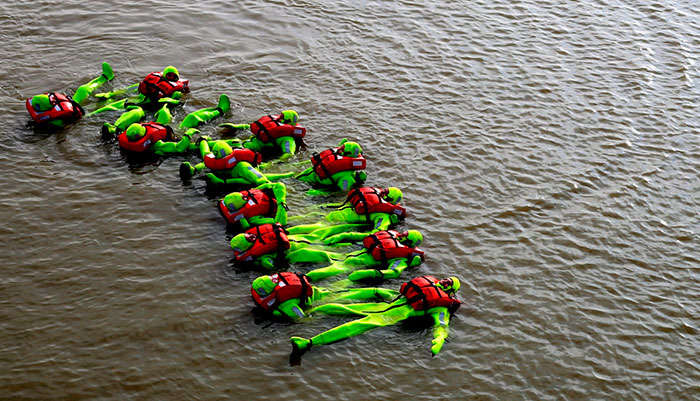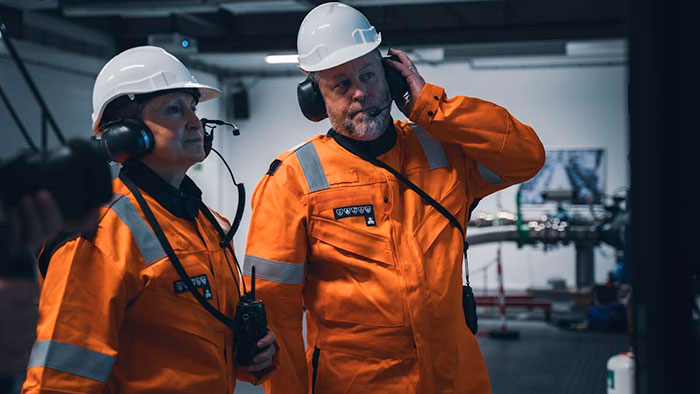Морські навчально-тренажерні центри в Європі – частина 3: Німеччина та Нідерланди.
26.08.2025
23695
Вже більше трьох років українські моряки, незважаючи на всі складнощі, знаходять нові шляхи і можливості, щоб продовжувати кар'єру в морі. Раніше «Вісник крюїнгу» публікував список навчально-тренажерних центрів для моряків у Польщі, Латвії, Румунії, Хорватії та на Кіпрі.
У цьому матеріалі ми зосередимося на тому, де отримати або продовжити морські сертифікати в Німеччині та Нідерландах, а також розглянемо, які навчальні центри для моряків готують фахівців для роботи на «розумних» суднах і з технологіями штучного інтелекту.
Якщо ви знаєте й інші НТЦ у Європі, які можете порекомендувати колегам, пишіть на нашу пошту support@ukrcrewing.com.ua, і ми додамо їх до цієї статті.
Навчально-тренажерні центри для моряків у Німеччині
У Німеччині проживає величезна кількість українських сімей у зв'язку з хорошою підтримкою держави. Однак морських УТЦ, в яких можна навчатися без знання німецької мови, небагато. Ми зібрали деякі з них.

Навчально-тренажерний центр, заснований компанією Marlow Navigation. Розташований у німецькому місті Гамбург. Тут можна пройти курси з навігації, технічних дисциплін: будови та роботи суднових двигунів, електротехніки, суднобудування, систем управління, радарів та інших тем. Навчання проводиться на сучасних симуляторах управління судном, симуляторі радара та ECDIS, рідких вантажів, двигунів, високовольтних систем, СУДС, ГМССБ, а також з використанням програмного забезпечення NAPA та інших. Інформація про навчання доступна також на офіційному сайті Marlow.
У тренажерному центрі в місті Леер пропонують 10-денні курси з техніки безпеки відповідно до стандартів STCW. Крім протипожежної підготовки та експлуатації рятувального обладнання, курс охоплює також запобігання піратству, ознайомлення з німецькими правилами щодо запобігання нещасним випадкам (UVV-See) та надання першої допомоги. Також пропонується одноденний курс з безпеки (Security) і додаткові курси з роботи з СПГ і на шельфі. Центр працює з іноземними студентами.
Центр морської компетентності в Ельсфлеті (MariKom) поєднує морську підготовку з модульним навчанням з техніки безпеки для суднових механіків, офіцерів, портових логістів, молодших співробітників морської галузі та плавскладу. Пропонуються курси STCW, в тому числі з протипожежної підготовки, дій в аварійних ситуаціях, використання рятувального обладнання та надання першої допомоги. У центрі є тренажери, понтон і вода для практичних занять. Навчання проводиться переважно німецькою мовою. Однак для деяких курсів, особливо міжнародних стандартів (наприклад, STCW), можливе проведення занять англійською мовою. Рекомендується заздалегідь уточнювати мову конкретного курсу при реєстрації.
Навчальні та тренувальні об'єкти даного центру розташовані в чотирьох містах Німеччини: Гамбурзі, Бремені, Бремерхафені, Вільгельмсхафені. УТЦ пропонує курси для персоналу, що обслуговує різні типи флоту. Центр проводить базову підготовку з техніки безпеки, навчання пожежників на суднах і курси підвищення кваліфікації з медичного обслуговування. Доступні комп'ютерні курси з небезпечних вантажів та індивідуальні програми виживання на морі. Курси проводяться переважно німецькою мовою, доступність навчання англійською мовою потребує уточнення.
Знаходиться в місті Букстехуде (Buxtehude), земля Нижня Саксонія, Німеччина. Це невелике місто, приблизно в 25 км на південний захід від центру Гамбурга. Центр морської підготовки для офіцерів балкерів, штурманів і фахівців у галузі безпеки та охорони навколишнього середовища. NSB Academy оснащена двома повнофункціональними симуляторами містка, які можуть бути підключені онлайн до інших навчальних центрів по всьому світу.
DNV — провідний світовий постачальник програмного забезпечення та цифрових рішень, у тому числі для морської галузі. Крім стандартних курсів з міжнародних вимог STCW, ISM, ISPS, MLC, Академія DNV проводить навчання аудиторів, інспекторів, суперінтендантів і фахівців з обслуговування суднового обладнання із застосуванням технологій штучного інтелекту. Серед напрямків — технології Digital Twin, доповнена реальність, автономні судна, кібербезпека, проектування та суднобудування. Навчання можливе і в онлайн-форматі. Також пропонуються курси з кодексу IMDG, корабельних технологій та альтернативних видів палива для танкерів, балкерів і контейнеровозів.
Спеціалізований центр морської та офшорної підготовки у складі AFZ Aus- und Fortbildungszentrum Rostock GmbH. Пропонує повний спектр курсів за міжнародними стандартами STCW — від базової та повторної підготовки до спеціалізованих модулів з пожежної безпеки, медичної допомоги, роботи з рятувальними шлюпками та на пасажирських суднах. В офшорному напрямку центр проводить навчання BOSIET, HUET (включаючи CA-EBS), а також інші тренінги з безпеки для працівників морських бурових платформ і вітроенергетики. В рамках програм GWO (Global Wind Organisation) доступні курси Sea Survival, Fire Awareness, Working at Heights, First Aid та інші. Навчальна інфраструктура включає сучасні тренажери, басейн для практики морської евакуації та симулятори для відпрацювання аварійних ситуацій.
Симуляційний центр морського факультету Університету прикладних наук Вісмар (Варнемюнде, Німеччина), єдиний у світі, що об'єднує тренажери навігації, технічної експлуатації судна та берегових служб VTS. Навчає студентів і діючих моряків — судноводіїв, механіків, капітанів і штурманів. Оснащений чотирма комплексами: містковий симулятор (Ship Handling Simulator), імітатор суднового двигуна (Ship Engine Simulator), тренажер служб руху суден (Vessel Traffic Services Simulator) і тренажер з безпеки та охорони судна (Ship Safety & Security Trainer).
Отримати / продовжити морські сертифікати в Нідерландах

DRTC Groningen має ключову особливість — наявність власного навчального танкера Lingepoort, який був спеціально переобладнаний для практичних занять з рятування на морі і постійно базується в навчальному центрі. Центр спеціалізується на підготовці палубних матросів і пропонує широкий спектр освітніх програм, включаючи курси за конвенцією STCW, навчання за кодексами IGF і POLAR, програми управління судном, а також курси з морських і вітрових технологій.
На додаток до основної програми DRTC Groningen проводить підготовку офіцерів безпеки (як на судні, так і в порту), організовує медичне навчання та курси з пожежогасіння. Центр розташований у порту Фінсе-Хавен у Гронінгені, що забезпечує зручний доступ до морської інфраструктури.
Навчання проходить голландською та англійською мовами. Більшість курсів проводяться очно, проте, є і онлайн-формат, наприклад, для програми Maritime Dutch Law Assessmen.
Професійний навчальний центр у Роттердамі (Maashaven), який спеціалізується на курсах безпеки та медицини для працівників офшорної та вітроенергетичної галузей. Пропонує онлайн-навчання STCW через платформу STCW.online (можна навчатися і складати іспити навіть у морі). Крім того, тут за запитом можна узгодити індивідуальне проходження частини конкретного курсу. У центрі надають допомогу з оформленням книжки моряка. Основне навчання проводиться англійською мовою.
Цей тренажерний центр належить найбільшій круїзній компанії Carnival Corporation, яка управляє флотом з понад 90 суден. У центрі працює Академія морської підготовки з власним центром симуляторів, відома як Академія CSMART. Після закінчення навчання є можливість працевлаштування в Carnival Corporation. Передбачені онлайн-курси для тих, хто не може відвідувати заняття очно.
У RBG представлені курси за стандартами STCW і MLC-2006 для офіцерів і матросів торгового та пасажирського флотів, а також для портових працівників. На офіційному сайті є інформація про те, які держави-прапори приймають сертифікати STCW від Rood Boven Groen. Серед популярних курсів: Security Awareness, Crisis Management & Human Behaviour, Passenger Safety, Cargo Safety and Hull Integrity. Більшість курсів мають онлайн-формат.
Сучасний навчально-тренажерний центр, який пропонує курси з навчання роботі на містку, управління суднами, організації вантажоперевезень і внутрішніх перевезень, а також спеціалізовані програми для механіків. У центрі встановлено чотири симулятори містка, оснащені системами DP-2 і моделями морських суден. Програми навчання розроблені на основі керівництва HELM (Лідерство та управління людським фактором), вимог MNTB та положень розділів A-II/1 і A-II/2 Міжнародної конвенції про підготовку та дипломування моряків і несіння вахти. Особливе місце в навчальному плані займає курс «ship to ship», призначений для капітанів, лоцманів і швартовиків.
УТЦ, який спеціалізується на підготовці фахівців для нафтогазової, хімічної та офшорної галузей. Основна увага приділяється тренінгам з безпеки, включаючи програми BOSIET, FOET, HUET, EBS, CA-EBS, 0.5A і 0.5B. Тренажерний центр знаходиться в порту Роттердама і займає площу близько 7000 квадратних метрів, включаючи найбільший в континентальній Європі басейн для тренувань з виживання на морі. DELTA має акредитацію OPITO і NOGEPA, а їхні сертифікати визнаються міжнародним співтовариством нафтогазових і офшорних компаній.
Це навчальний заклад при Університеті прикладних наук у Нідерландах. Пропонує 10 курсів з морських спеціальностей, включаючи електротехніку, роботу в полярних водах, моделювання та перепідготовку на системі DP, а також курси для офіцерів і капітанів різних типів суден, включаючи буксири. Навчання проходить на сучасних симуляторах: повнорозмірні містки, віртуальне машинне відділення, симулятори обробки вантажів, динамічного позиціонування, високовольтних систем, радіолокаційної навігації (ARPA) і ГМЗЛБ.
Сертифікований центр навчання техніці безпеки за стандартами STCW, OPITO, NOGEPA та GWO. Курси орієнтовані на фахівців нафтової, газової, вітрової промисловості та офшору. Доступний змішаний формат навчання: теоретична частина проходить онлайн, а практична — в одному з центрів в Амстердамі, Роттердамі, Лаге Цвалюве або Аймейде. Також FMTC має міжнародні представництва в Х'юстоні (США), Дюнкерку (Франція) і Даммамі (Саудівська Аравія).
«Вісник крюїнгу» бажає вам знайти саме той навчально-тренажерний центр, який допоможе залишатися «на плаву» і розвиватися в професії. Ми будемо раді, якщо змогли хоч трохи полегшити пошуки.
Якщо ви хочете стати співавтором статті, напишіть нам на support@ukrcrewing.com.ua, в якому навчальному центрі Європи ви проходили навчання і чим він запам'ятався. Ми із задоволенням розмістимо цю інформацію для всіх моряків ukrcrewing.com.ua.
У наступному матеріалі плануємо висвітлити навчально-тренажерні центри для моряків Норвегії, Італії та Іспанії.
Автор статті: власний кореспондент Ілона Скрипник




